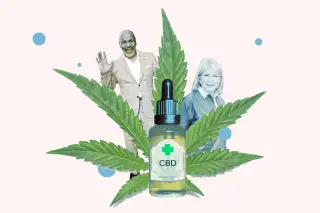Celebrities Are Rushing to Invest in CBD. Should You?

CBD is in the middle of a business boom. Sometimes known as “the other weed,” cannabis-derived cannabidiol is quickly catching on in products marketed and sold throughout the United States, ranging from infused tinctures and oils to premium chocolate bars and even a $50 jar of “rejuvenating” clay mask that claims to utilize the anti-inflammatory properties of the cannabinoid to reduce redness and breakouts.
The CBD industry is already worth $1 billion, and Wall Street experts think it could reach $16 billion by 2025. Meanwhile, celebrities are quickly flocking to this alternative-pot market, as well as to growing legal cannabis category in general. Martha Stewart announced that she’ll launch her own CBD line in partnership with cannabis giant Canopy Growth, one of the companies that has investors salivating. Her friend Snoop Dogg has his own Leafs by Snoop brand. And Mike Tyson, a heavy CBD user, is literally starting his own cannabis farm.
This is enough to make a casual consumer wonder if they should put their money on the ballooning CBD industry. But there are plenty of questions and caveats to keep in mind before jumping into the game. “There is a cloud of uncertainty regarding CBD,” Alan Brochstein, founder of New Cannabis Ventures and 420 Investor, told Money of the caution potential investors should practice.
Here’s what to consider if you’re thinking about investing in the CBD market, whether you personally dose yourself or not.
CBD Is legal. But how legal?
“Investors need to be aware that the regulatory environment is in flux,” Brochstein says of the current state of CBD in the United States.
The farm bill passed in December 2018 technically legalized industrial hemp, defined as cannabis with levels of THC—the chemical compound that produces the psychoactive high we associate with this special greenery—below 0.3% of the plant weight. This is widely seen as a boon for CBD business. But products containing cannabidiol are still in a regulatory gray area.
“On the federal side, the FDA is looking at regulating the sale,” Brochstein adds. “This could be positive or negative, depending exactly upon how the process evolves. Extremely strict regulations that limit sales to companies that have approved products would be detrimental. Guidelines with certain standards would be beneficial to the leading players in the market today.”
The FDA has mostly stayed on the sidelines, only occasionally cracking down on companies selling CBD with false claims. But it holds broad power to decide how the market moves forward, especially as research on purported benefits of CBD is in its infancy.
What about local regulation?
While the farm bill cleared a major hurdle for CBD’s capitalistic path, it’s far from the end. Local laws also govern how CBD can be produced and sold for consumers.
“The regulation at the state level is complicated and could require products sold in a state to be produced there,” Brochstein advises.
There’s a misconception that CBD is legal across all 50 states. While hemp-derived CBD has some federal protection now, state legislation remains murky and confusing. “There are many states where it is not yet [explicitly] legal.” Colorado has legalized utilizing all parts of the hemp plant in food items. Texas, for its part, has made items with even trace amounts of THC illegal. And the rules are constantly evolving as lawmakers catch up, which can be a headache for those waiting for a massive push in revenue.
“Many retailers are willing to sell topical CBD products [such as beauty creams] but not ingestible ones,” Brochstein adds. General consensus is that ingestibles are more prone to oversight. Yet “ingestibles are, by far, the largest part of the market at this time.”
How stable is the CBD market?
The CBD market is, by any reasonable measure, on an explosively upward trajectory. But being mostly untested, it’s “a bit chaotic,” Brochstein says. “The number of places at which CBD is available has soared, ranging from gas stations to the finest retail stores. The large chains of grocery stores and drug stores are selling topical products, though this segment has traditionally been just a small part of the overall market.”
A potential warning sign is that “growth has been slowing for the largest CBD sellers. CV Sciences has repeatedly pointed to issues in certain states on the regulatory front.”
Still, if you’re seeking to invest in cannabis, CBD is a safer bet at the moment than THC, which is more strictly prohibited despite scattered regional legalization. If you're still feeling uneasy, maybe consider looking into the best cannabis insurance options (yeah, that's a thing).
Which CBD company is the right one?
Publicly traded CBD-based companies continue to crop up, including Colorado-based Charlotte’s Web, a darling of the space (and client at Brochstein’s New Cannabis Ventures). But being publicly traded does not necessarily make a firm a smart investment.
Brochstein firmly advises against handing your dollars to companies that don’t file with the SEC, including some trading on markets. He’s also wary of firms that seem to be suddenly altering their plan to take advantage of the CBD surge, without a deep background in the field.
By the same token, companies that are playing by the rules, grabbing marquee names, and exhibiting a genuine interest in building on the marketable possibilities of CBD, are the ones that may be worth the time it takes to do in-depth research. In a suddenly crowded and shaky market, it’s all about finding the most likely green-tinged bet.